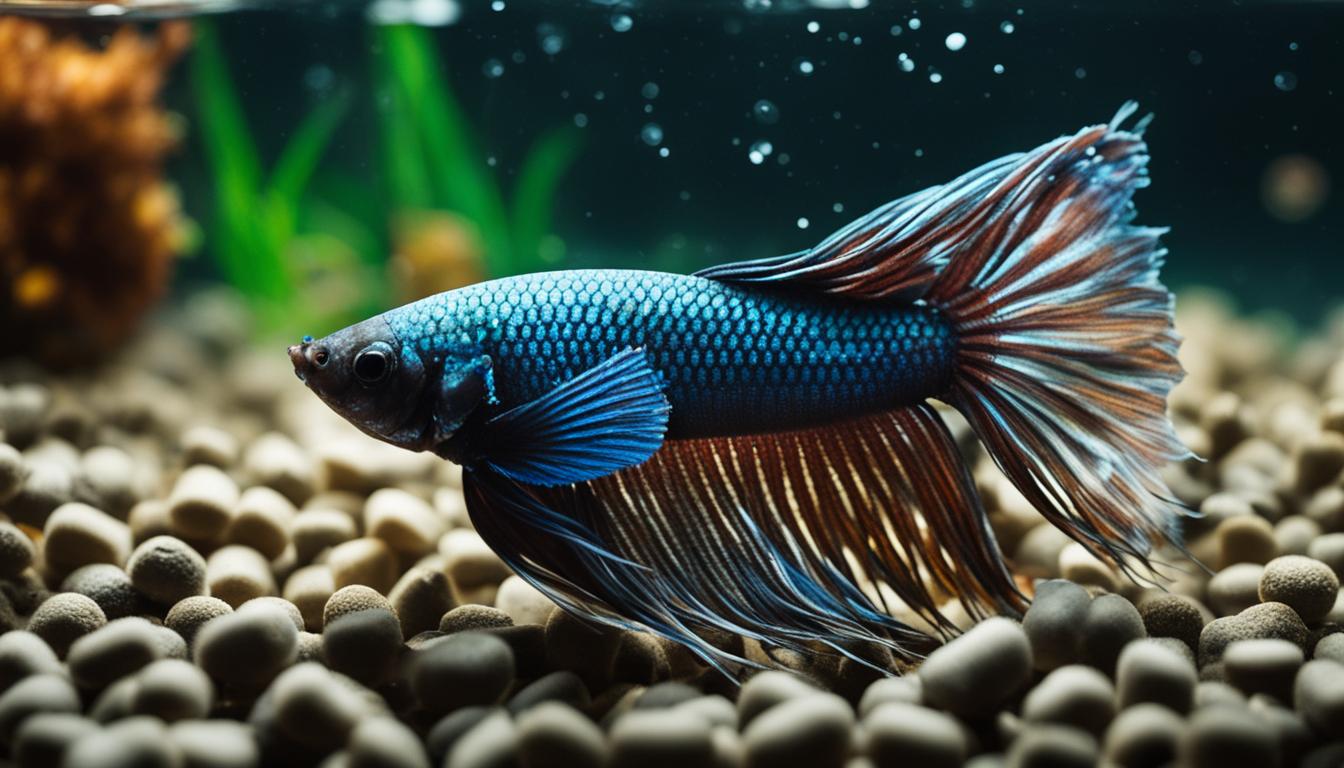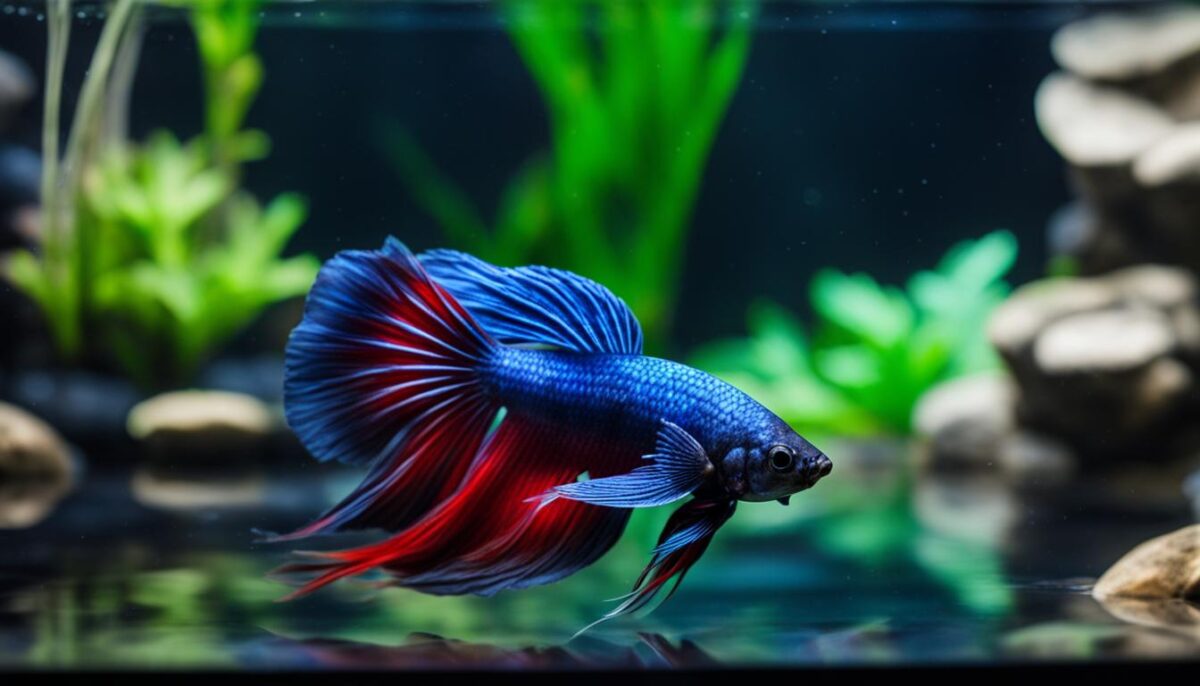Are you worried because your betta fish won’t eat? It’s important to understand that a betta fish not eating can be a cause for concern among pet owners. There can be several reasons why your betta fish may refuse to eat, and it’s crucial to identify and address these issues for the well-being of your finned friend.
Stress, poor water quality, incompatible tankmates, illness, overfeeding, temperature fluctuations, old age, or breeding behavior can all contribute to appetite problems in betta fish. The refusal to eat can be a sign of underlying health or environmental issues that need to be addressed.
Don’t worry, we’re here to help you understand why your betta fish might not be eating and how you can resolve this issue. Let’s dive into the common reasons and solutions for betta fish appetite problems.
Key Takeaways:
- Stress, poor water quality, incompatible tankmates, illness, overfeeding, temperature fluctuations, old age, or breeding behavior can cause a betta fish to refuse food.
- Monitoring water parameters and ensuring they are within the appropriate range is essential to address appetite problems.
- Inspecting betta fish for signs of illness and maintaining a consistent feeding schedule with small amounts of high-quality betta pellets or flakes can help resolve appetite issues.
- Removing any uneaten food promptly and maintaining a clean tank environment are crucial for betta fish health.
- If the issue persists or there are concerns about your fish’s health, consult a vet experienced in treating fish or seek advice from a knowledgeable aquarium professional.
Common Reasons for Betta Fish Not Eating
When your betta fish refuses to eat, there can be several common reasons behind this behavior. Understanding these factors can help you address the issue and ensure the well-being of your pet.
Stress: Stress can have a significant impact on a betta fish’s appetite. Sudden changes in the environment, such as fluctuations in water parameters or the presence of aggressive tankmates, can lead to stress and a loss of appetite.
Poor Water Quality: High levels of ammonia or nitrite in the water can cause stress and affect a betta fish’s eating habits. It is crucial to maintain proper water quality by regularly testing and adjusting the parameters to create a healthy environment.
Illness: Various illnesses, including fin rot, fungal infections, or parasitic diseases, can make a betta fish hide and reduce its appetite. It is essential to monitor your fish for any signs of illness and take prompt action if necessary.
Overfeeding: Overfeeding is a common mistake that can lead to digestive issues and bloating in betta fish. This can result in a loss of appetite. It is important to feed your fish the appropriate amount and remove any uneaten food promptly.
Temperature Fluctuations: Rapid fluctuations in temperature can stress betta fish and impact their eating habits. It is crucial to maintain a stable water temperature within the recommended range to prevent any adverse effects on their appetite.
Old Age: As betta fish age, their appetite may decrease, and they may become less active. It is essential to provide appropriate care and adjust their diet according to their changing needs.
Breeding Behavior: Male betta fish may experience a temporary loss of appetite during breeding behavior, such as territorial aggression or building bubble nests. This is a natural behavior, and their appetite usually returns to normal once the breeding activity subsides.
By considering these common reasons for betta fish not eating and taking appropriate measures to address them, you can help your fish maintain a healthy appetite and overall well-being.
Addressing the Issue of Betta Fish Not Eating
To address the issue of a betta fish not eating, there are several key factors that need to be considered and addressed. By taking the following steps, you can help your betta fish regain its appetite and ensure its overall well-being.
Monitoring Water Parameters
First and foremost, it is crucial to check and maintain the proper water parameters in your betta fish’s tank. A stable and clean environment is essential for their health and appetite. Regularly monitor the temperature, pH levels, and levels of ammonia, nitrite, and nitrate in the tank. Fluctuations or imbalances in these parameters can stress out your betta fish and cause it to lose its appetite. Use appropriate water conditioners and filters to maintain optimal water quality.
Observing Tankmates
Another important aspect to consider is the behavior of any tankmates your betta fish may have. Some fish species can be aggressive or stress-inducing, causing your betta fish to feel threatened and reluctant to eat. Observe the interactions between your betta fish and other tankmates. If there is any aggression or bullying behavior, consider providing separate living spaces for your betta fish or choosing tankmates that are compatible and peaceful.
Inspecting for Illness
Illness can also be a significant factor in betta fish appetite problems. Inspect your betta fish for any signs of illness, such as changes in color, abnormal growths, or unusual behavior. Common betta fish illnesses include fin rot, fungal infections, and parasitic diseases, which can cause a loss of appetite. If you notice any concerning symptoms, consider quarantining your betta fish for closer observation and potential treatment. Consulting a veterinarian experienced in fish care is recommended for proper diagnosis and treatment.
Maintaining a Feeding Schedule
Establishing a consistent feeding schedule is crucial for betta fish. Feed your betta fish small amounts of high-quality betta pellets or flakes once or twice a day. Overfeeding can lead to digestive issues and lack of appetite, so it’s important to provide the right amount of food. Avoid leaving uneaten food in the tank, as it can compromise water quality. Remove any excess food promptly to maintain a clean and healthy environment for your betta fish.
By addressing these key factors of betta fish not eating, you can help improve their appetite and overall well-being. Remember to monitor the water parameters, observe tankmates’ behavior, inspect for signs of illness, and maintain a consistent feeding schedule. Taking proactive steps to create a suitable and stress-free environment will enhance your betta fish’s health and stimulate its appetite.
Conclusion
Betta fish not eating can be a concern for pet owners, but it’s essential to identify and address the underlying reasons for the appetite problems. Several factors can contribute to a betta fish refusing to eat, including stress, poor water quality, incompatible tankmates, illness, overfeeding, temperature fluctuations, old age, and breeding behavior.
To help ensure the well-being of your betta fish, it’s important to monitor the water parameters regularly. This includes checking the temperature, pH levels, and levels of ammonia, nitrite, and nitrate. Observing the behavior of the tankmates is also crucial to ensure there is no aggression or stress causing the betta fish to lose its appetite.
Inspecting your betta fish for signs of illness, such as changes in color or abnormal growths, is important. If needed, consider quarantining the fish for closer observation and potential treatment. Maintaining a consistent feeding schedule with small amounts of high-quality betta pellets or flakes is recommended, and any uneaten food should be promptly removed to maintain water quality.
If the issue persists or if you have concerns about your fish’s health, it’s advisable to consult a vet experienced in treating fish or seek advice from a knowledgeable aquarium professional. Regular monitoring of your betta fish’s behavior and the aquarium environment is crucial for their overall health and happiness.
FAQ
Why is my betta fish not eating?
There can be several reasons why a betta fish may refuse to eat. It could be due to stress, poor water quality, incompatible tankmates, illness, overfeeding, temperature fluctuations, old age, or breeding behavior.
What can cause stress in a betta fish?
Changes in their environment, such as sudden changes in water parameters or the presence of aggressive tankmates, can lead to stress in betta fish.
How does poor water quality affect a betta fish’s appetite?
Poor water quality, with high levels of ammonia or nitrite, can stress the fish and affect their eating habits.
Can illness affect a betta fish’s appetite?
Yes, illnesses like fin rot, fungal infections, or parasitic diseases can cause a betta fish to have a decreased appetite.
Can overfeeding lead to a loss of appetite in betta fish?
Yes, overfeeding can result in digestive issues and bloating, leading to a loss of appetite in betta fish.
How do temperature fluctuations impact a betta fish’s eating habits?
Sudden temperature fluctuations can stress the fish and impact their eating habits.
Do elderly betta fish eat less?
Yes, elderly betta fish may eat less and become less active.
Can breeding behavior affect a male betta’s appetite?
Yes, breeding behavior, including territorial behavior or building bubble nests, can affect a male betta’s appetite.
How can I address the issue of a betta fish not eating?
It is important to check the water parameters, observe tankmates, inspect for signs of illness, and maintain a consistent feeding schedule with small amounts of high-quality betta pellets or flakes.
When should I consult a vet or aquarium professional?
If the issue persists or if there are concerns about the fish’s health, it is advisable to consult a vet experienced in treating fish or seek advice from a knowledgeable aquarium professional.
Why is it important to monitor the betta fish’s behavior and aquarium environment?
Regular monitoring of the betta fish’s behavior and the aquarium environment is essential for their overall health and happiness.

